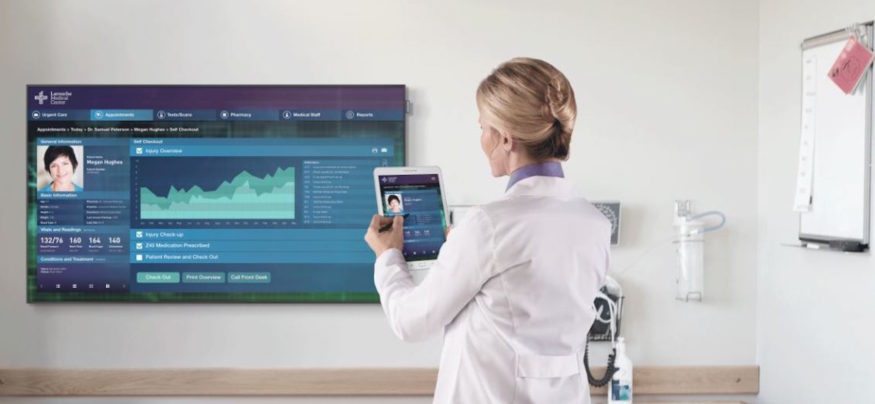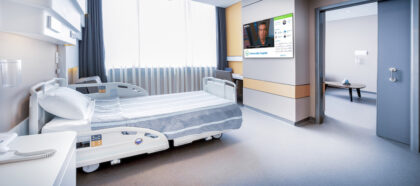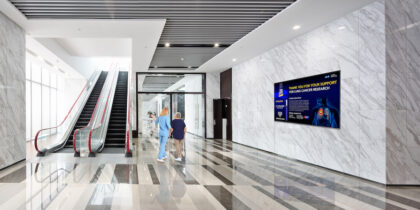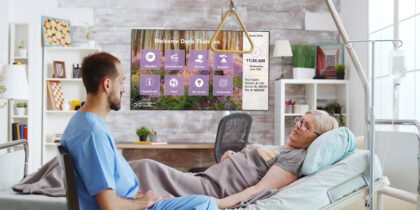Spending time in a hospital can be overwhelming. Between being shuffled around for diagnostic tests, waiting on results and talking to various care providers, patients receive a lot of education in a short time. This can make it challenging to understand and retain information that’s vital to healing.
That’s why cutting-edge hospitals such as Baptist Memorial Health Care are using new technology to provide all the information patients need to feel comfortable during their stay, and to manage their conditions when they get home.
More than 75 percent of hospitals had adopted at least a basic electronic health records system as of 2014, according to the American Hospital Association Health Forum. This enables nurses, physicians and other care providers to access a single, secure patient record, eliminating the need for redundant medical tests and ensuring everyone is on the same page.
The next step: Looping patients into the conversation by giving them easy access to their health data.
Making Patients and Families Part of the Care Team
In July 2015, Baptist Memorial launched the MyChart Bedside pilot program, giving patients and families access to Baptist OneCare, an electronic health records platform developed by industry leader Epic Systems.
Pilot “smart rooms” feature large touch-screen monitors displaying patient vitals and medical team information. Patients also receive 10-inch tablets, on which they can view their health records and test results, see daily treatment schedules, communicate with care providers and receive disease management education.
The pilot also includes a companion app — the MyChart portal. Approved family members can log in remotely to see what’s happening with their loved ones. Outpatients can also use the app to schedule appointments, request prescription refills and communicate with care providers from their smartphones.
Chris Altendorf, director of Baptist OneCare Inpatient Nursing/Clinical Areas at Baptist-Memphis, says this new technology helps patients become more involved in their treatment. “Anytime you have patient and/or family engagement, the patient will do much better,” she explains. “They know what’s going on and what to expect. They know what questions to ask and what to look for, and typically that results in better care. It keeps them out of the hospital for longer periods of time. This is really what healthcare is all about at this point — better management of patients through the clinic and hospital, and getting them back to the home environment.”
Altendorf says the primary goals for the pilot are to improve patient satisfaction as well as communication with the patient. And feedback from patients suggests that Baptist Memorial is on the right track. “Patients and families love it, because it shows them exactly what’s going to happen,” she explains. “It gives them a sense of comfort they didn’t have before. If they miss some piece of information, they can go back and look at it again. Particularly with the education piece, it’s all right there in front of them on a tablet and is very clear.”
Putting the Right Technology in the Right Hands
Altendorf says the mobile, user-friendly nature of tablets makes these devices the perfect fit for this program. “They’re very clear, handy, and not too heavy,” she explains. “Compared to a smartphone, which is relatively small, tablets provide better ease of reading, particularly for elderly patients. Tablets are really the perfect solution for that. We’ve had patients of all ages using them without any problems.”
When selecting tablets for the program, Baptist Memorial’s primary considerations were screen resolution and the ability to withstand regular disinfection routines. “We use antiseptic wipes that are so strong you have to wear gloves to use them,” says Altendorf. “We haven’t had any trouble with the tablets standing up to that.”
For the first six months of the pilot, Baptist Memorial used the MyChart Bedside solution in its transplant unit, which is a 12-bed unit with tablet use for four patients at a time. In early 2016, the program will be moved to a cardiac unit, where more patients will have the opportunity to try it out. “Staff in this new unit are fully bought in and very excited, because they believe this is the way of the future with communication with patients. Based on the success of our MyChart application with outpatients, that is overwhelmingly true. Patients wouldn’t trade that application for the world. They are very excited to be engaged.”
Based on the pilot’s success in the new unit, Baptist Memorial will begin assessing which other patient populations could benefit from this technology, and will eventually expand to include other units that serve those with chronic diseases.








